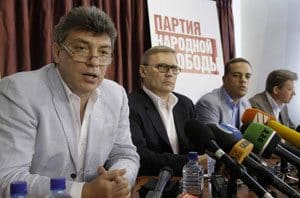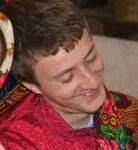The People’s Freedom Party, also known as “Parnas,” was founded on September 16, 2010. It is a coalition of four organizations: Russian People’s Democratic Union; Republican Party of Russia; Democratic Choice; and certain members of the Solidarity movement. None of the four organizations are registered political parties, although some had attempted to register and were denied by Russia’s Ministry of Justice.
The formation of the coalition led to a significant split within the Solidarity movement, which is itself an umbrella group for opposition movements. Some within Solidarity felt strongly that they should not be a part of a registered political party because, they argue, mainstream political efforts are either corrupt or the exclusive realm of actors chosen by the Kremlin. Thus, Garry Kasparov, one of Solidarity’s most vocal and best-known members did not join the new movement. Neither did the organization he leads as part of the Solidarity movement, United Civil Front.

The co-founders of PARNAS from left to right: Boris Nemtsov, Mikhail Kasyanov, Vladimir Mylov and Vladimir Ryzkov during a press conference after the Ministry of Justice refused to register the organization as a political party.
Some Russia-watchers speculated that this party might prove to be Russia’s first successful attempt at a real grass-roots, non-Kremlin supported opposition political movement. First, the four leaders of Parnas’s component organizations, Mikhail Kasyanov, Vladimir Ryzhkov, Boris Nemtsov, and Vladimir Milov are all experienced positions and former high-ranking government officials. Second, Parnas announced its formation at a time when the Kremlin was publically floating ideas to liberalize Russia’s political field. These included discontinuing registration requirements for political parties and lowering the electoral threshold for representation in the Duma from seven to three or five percent. However, while the threshold was eventually lowered to five percent, the Kremlin backed away from the idea of abolishing registration for political parties.
The People’s Freedom Party was denied registration in June of 2011. The official reasons were that the party had not provided for rotation of leadership in their party platform and had ineligible names on their party membership lists. The legality and justification for the decision was immediately called into question by Parnas and other organizations including the US Department of State. Indeed, many parties seem to be operating without the required “leadership rotation” clause in effect and the amount of “dead souls” on the membership lists were not enough to push the organization beneath (or even close to) the required number needed to register.
The organization decided not to resubmit their application and instead sued the Justice Ministry in an attempt to overturn the original application. Supporters insisted that resubmitting the documents would be futile and the Justice Ministry would continue to find reasons to deny the application; indeed, most parties that apply for registration are denied. Critics, however, argued that it showed that Parnas had never seriously intended to become a registered party and that it was acting more in the interests of the media for the Russian people.
The decision to not resubmit was contentiously made as was the debate on how to approach the elections in which Parnas would be barred from participating. Some held that a grand plan for holding Parnas-sponsored parallel elections across Russia at the same as the official elections would be effective at showing the true will of the people. Others held that the elections should be boycotted entirely and that low voter turnout would discredit the authorities. Still others felt that voters should be encouraged to arrive at voting stations but destroy their ballots as a protest measure that would also help prevent voter fraud. Others felt that voters should be encouraged to vote for any party except United Russia in an attempt to unseat Vladimir Putin’s base of power.
In the end, no central decision was made in how members should approach the elections. Other decisions discussed at the congress were also marked by disagreement and severe criticism of some members by others, leading at least one member, Vladimir Milov, to at one time leave the hall in protest.
The organization’s effectiveness thus remains in question. How they position themselves for the elections will likely be the true test of whether they will or can remain a political force.
The party platform rejected by the Justice Ministry is reproduced below in Russian and in a translation provided by SRAS.org as produced by students of translation working under supervision on the year-long Home and Abroad Program.
| Принята Учредительным съездом Политической партии «Партия народной свободы “За Россию без произвола и коррупции”» 13 декабря 2010 года (протокол № 1) |
Accepted By the inaugural congress Of the political party “People’s Freedom Party: For Russia without Lawlessness and Corruption” December 13, 2010 (Protocol No 1) |
| Программа | Program |
| Политической партии «Партия народной свободы | Of the political party “People’s Freedom Party: |
| “За Россию без произвола и коррупции”» | For Russia without Lawlessness and Corruption” |
| Главная цель нашей политической деятельности – превращение России в страну, в которой человек, его права и свободы являются высшей ценностью, а их защита – главной обязанностью государства. Мы хотим построить в России современное общество, опирающееся на инициативу и творческую энергию свободных граждан. Общество, в котором нет места произволу и коррупции. Общество, которое гарантирует достаточную социальную защиту всем, кто в ней реально нуждается. Общество, экономические достижения которого обеспечивают стране достойное место на международной арене. | The main goal of our political activity is to transform Russia into a state in which a person and his or her rights and freedoms are of the highest value, and their protection is the most important duty of the government. We want to build a modern society in Russia, one based on the initiative and creative energy of free citizens. A society, in which there is no place for lawlessness or corruption. A society, which guarantees sufficient social protection to all who are actually in need. A society whose economic achievements secure the country a worthy place in the international arena. |
| Основная задача партии – приход к власти в рамках конституционных процедур и восстановление в России основ государственного строя, определенных Конституцией Российской Федерации ради достижения следующих целей: | The main task of the party is to create the foundations of a governing system in Russia within the frameworks of constitutional procedures and renewal, as formed by the Constitution of the Russian Federation, for attaining the following goals: |
|
|
|
|
|
|
| Задачи партии в сфере государственного строительства: | The party’s tasks in the sphere of state building are: |
|
|
|
|
|
|
|
|
|
|
|
|
| Задачи партии в социально-экономической сфере: | The party’s tasks in the social-economic sphere: |
|
|
|
|
|
|
|
|
|
|
|
|
|
|
|
|
|
|
| Задачи партии во внутренней политике: | The party’s tasks in domestic politics: |
|
|
|
|
|
|
|
|
|
|
|
|
|
|
| Россия в мире | Russia in the world |
| России необходимо восстановление нормальных, дружественных отношений с соседними государствами, бывшими республиками СССР. Россия должна стать частью общеевропейской цивилизации; всесторонняя интеграция с Европейским Союзом во всех сферах жизни отвечает интересам российских граждан. Трезвая оценка существующих угроз в международной сфере делает необходимым постепенное движение к формированию Союза Россия-НАТО для обеспечения европейской и глобальной безопасности на основе единых ценностей. | Russia needs to restore normal, friendly relations with neighboring states, the former republics of the Soviet Union. Russia should become part of the pan-European civilization; should integrate comprehensively with the European Union in all spheres of life that echo the interests of the Russian people. A sober assessment of the present dangers in the international sphere necessitates gradual movement towards the formation of a Russia- NATO union in order to ensure European and global safety on the basis of common values. |
| Принципы деятельности, методы реализации целей и решения задач Партии | Working principles and ways to achieve the goals and complete the tasks of the party |
| Партия осуществляет свою деятельность, основываясь на принципах добровольности, равноправия, самоуправления, законности и гласности. Партия реализует свои цели любыми не запрещенными законодательством методами как непосредственно, так и через своих представителей в выборных органах государственной власти и органах местного самоуправления. | The Party performs its activity based on the principles of voluntary participation, equality, self-government, lawfulness, and openness. The party realizes its goals through any means not prohibited by law, either directly or through representatives in the elected bodies of state power or local government. |




